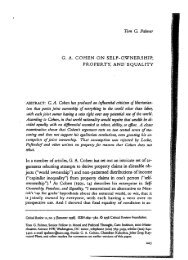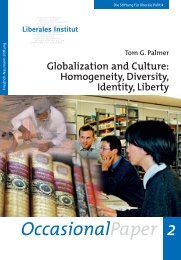Are Patents and Copyrights Morally Justified? - Tom G. Palmer
Are Patents and Copyrights Morally Justified? - Tom G. Palmer
Are Patents and Copyrights Morally Justified? - Tom G. Palmer
You also want an ePaper? Increase the reach of your titles
YUMPU automatically turns print PDFs into web optimized ePapers that Google loves.
864 Harvard Journal of Law & Public Policy IVol. 1~$<br />
built on the foundation ofrights to tangible objects. But a trade<br />
secret is not a right against the whole world, as a patent is, but<br />
a right against those who interfere with rights to tangible goods<br />
or who violate legally binding contracts. A monopoly right restricting<br />
others, for example, from independently inventing<br />
<strong>and</strong> building a new contraption cannot rest on a foundation of<br />
contract, for contract presupposes consent <strong>and</strong> the point ofintellectual<br />
property rights is that they bind non-consenting<br />
parties.<br />
Finally, property has been examined as a means ofrealizing<br />
freedom <strong>and</strong> achieving social coordination, “justice-as-order.”<br />
The foundation ofsuch a system of’social coordination is selfownership,<br />
the “node” around which the conventions ofproperty<br />
are constructed. Self-ownership is an “obvious” solution<br />
to coordination games <strong>and</strong> plays an important role in the historical<br />
development of natural law. Such “games” in real life<br />
are played because of the scarcity of resources. If goods were<br />
truly superabundant, there would be no need for property, for<br />
conflicts could not arise. The very nature ofan economic good<br />
involves choice, however, <strong>and</strong> choice implies scarcity. This is<br />
most obviously true of our own bodies, which can be used as<br />
food for others, as objects to gratify the sexual lusts of others,<br />
or in a number of other ways. The problem forwhich self-ownership<br />
provides the answer is how to allocate rights over the<br />
most scarce of scarceresources, one’s own body. This principle<br />
ofself-ownership then, by analogy provides the basis for ownership<br />
of objects that are not parts ofour body.’ 66<br />
The key to all of this is scarcity. Without scarcity, an argument<br />
based either on the realization of freedom or on finding a<br />
solution to coordination games cannot generate a property<br />
right. Tangible goods are clearly scarce in that there are conflicting<br />
uses. It is this scarcity that gives rise to property rights.<br />
Intellectual property rights, however, do not rest on a natural<br />
scarcity of goods, but on an “artificial, self created scarcity.”<br />
That is to say, legislation or legal fiat limits the use of ideal<br />
objects in such a way as to create an artificial scarcity that, it is<br />
hoped, will generate greater revenues for innovators. Property<br />
rights in tangible goods channeled them into their most highly<br />
166. Recall the discussion byJohn Locke regarding the questionofwhen acorns that<br />
aperson haseaten becomehis own: “sohis, [that is], apartofhim, that another can no<br />
longer have any right to it.” J. LOCKE,supra note 42, at 328.











